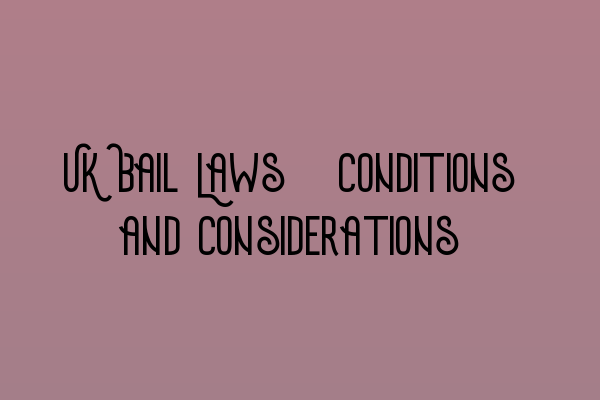UK Bail Laws: Conditions and Considerations
Welcome to SQE Criminal Law & Practice Law UK blog! In this article, we will discuss the important aspects of UK bail laws, specifically the conditions and considerations involved. Understanding the nuances of bail is essential for legal professionals and aspiring solicitors alike.
Introduction to Bail
Bail is the temporary release of an accused person awaiting trial or sentencing. It allows individuals to be free from custody while still ensuring their attendance in court when required.
In the UK, bail is governed by a set of laws and regulations that dictate the conditions and considerations surrounding its granting. These laws aim to balance the defendant’s right to liberty with the need for public safety and court proceedings.
Conditions for Bail
When granting bail, the court may impose certain conditions on the accused. These conditions serve to mitigate the potential risks associated with releasing someone from custody. Some common conditions include:
- Residence requirement:
- Reporting requirement:
- Curfew:
- Non-contact:
The court may require the accused to provide an address where they will reside during the bail period. This helps ensure their availability and facilitates communication with the authorities.
The accused may be required to regularly report to a police station or probation officer. This allows the authorities to monitor their activities and ensure compliance with any other imposed conditions.
A curfew may be imposed, restricting the accused’s movements during specific hours. This condition helps maintain public safety, especially if the individual is deemed a flight risk or poses a threat to others.
If the accused has been charged with offenses involving specific individuals, the court may enforce a non-contact condition. This prohibits any form of communication or physical contact with the alleged victims or witnesses.
Considerations for Bail
When determining whether to grant bail, the court takes various factors into consideration, including:
- Nature of the offense:
- Risk of absconding:
- Previous criminal record:
- Community ties:
The seriousness of the crime and the potential harm posed by the defendant are crucial aspects considered by the court. More serious offenses may result in a higher likelihood of custody or stricter bail conditions.
If there are concerns that the accused may fail to attend court proceedings, flee the jurisdiction, or pose a flight risk, the court may be inclined to deny bail or impose stringent conditions.
An individual’s past criminal behavior may influence the court’s decision regarding bail. A history of similar offenses or breaches of bail conditions could impact their chances of being granted bail.
The accused’s connections to the local community, such as family, employment, or other social ties, may be taken into account. Strong community ties can demonstrate an increased likelihood of attending court and complying with bail conditions.
Understanding the conditions and considerations surrounding bail is crucial for legal professionals practicing criminal law. If you’d like to enhance your knowledge further, we recommend checking out our related articles:
- SQE 1 Practice Exam Questions
- SQE 1 Practice Mocks FLK1 FLK2
- SQE 2 Preparation Courses
- SQE 1 Preparation Courses
- SRA SQE Exam Dates
Thank you for reading! Stay tuned for more insightful articles on SQE Criminal Law & Practice Law UK.
